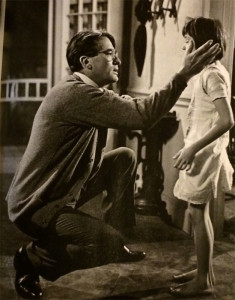 Since the publication of Go Set a Watchman last July, I’ve written at least four articles related to the legacy of Atticus Finch and the diminution of that legacy by Watchman. OK, truth be told, it’s more accurate to say that I’ve written and edited – and never quite completed – four variations of such an article. In part, that writing was left unfinished because I, like so many people, understand the limitations of To Kill a Mockingbird’s simplicity (and its white-centeredness) but nevertheless have been profoundly impacted, even motivated, by that simplicity. And that’s a beautiful but a tricky thing, leaving one to struggle (as all white liberals must 🙂 ) with the paradoxes and drawbacks of Mockingbird’s myopia while learning – and being much the better for learning – its essential lessons about integrity, about compassion, and about love.
Since the publication of Go Set a Watchman last July, I’ve written at least four articles related to the legacy of Atticus Finch and the diminution of that legacy by Watchman. OK, truth be told, it’s more accurate to say that I’ve written and edited – and never quite completed – four variations of such an article. In part, that writing was left unfinished because I, like so many people, understand the limitations of To Kill a Mockingbird’s simplicity (and its white-centeredness) but nevertheless have been profoundly impacted, even motivated, by that simplicity. And that’s a beautiful but a tricky thing, leaving one to struggle (as all white liberals must 🙂 ) with the paradoxes and drawbacks of Mockingbird’s myopia while learning – and being much the better for learning – its essential lessons about integrity, about compassion, and about love.
Fast forward to February 19, 2016. On the death of Harper Lee, my oldest sister and mentor – a university department head of teacher education, who (like me) has worked on behalf of children and people with disabilities – dashed off the following letter to her colleagues. She and our mother were my first models for perceiving, being hurt by, and at least endeavoring to act against injustices in a society that – for whatever reasons – marginalizes people because of perceived differences. Here is why…
My Sister’s Letter:
Hello all,
Harper Lee has died and I find this very sad. At about age 11 I read To Kill a Mockingbird (my young but spunky mother always ensured I had books to read and we were avid library users). A few years later I saw the movie which was quite ‘old’ by then. Still I was profoundly moved by it, I think in our (sadly) racially charged culture we forget that the one direct reference in the book and film to killing a mockingbird was by Scout in reference to Boo Radley who had an undisclosed disability (autism, intellectual disability??). This doesn’t negate (to me) the powerful image of Atticus Finch quietly doing the right thing for Tom and my indignation about the racism inherent in Tom’s ultimate fate. Clearly Tom was also a mockingbird of sorts. The book and Gregory Peck’s powerful portrayal helped solidify in my formative years my dedication to fairness and equality for all.
My youngest sister, one of a sizable minority club of Harper Lee/Atticus Finch fans/attorneys (of whom my son is now an unofficial member) had the privilege of being Gregory Peck’s guest in the 1990s in Abingdon, VA because of some writing she did about To Kill a Mockingbird. Peck and Lee were earnest and sincere in their quest for social equality. Don’t ever doubt this about Harper Lee (or Gregory Peck).
Last year’s hype about Go Set A Watchman and criticism of Atticus as the great white savior are distressing to me. To me, the message was simple: do the right thing, treat others as you want to be treated and don’t kill a (metaphorical or literal) mockingbird.
Peace to all.
Leave a Reply